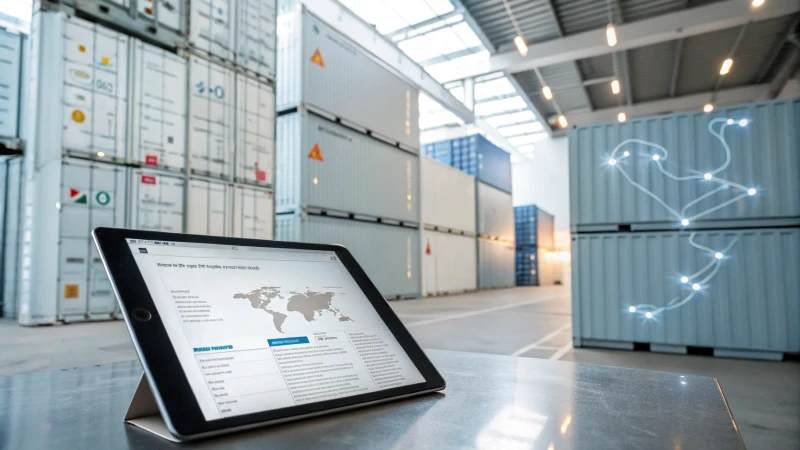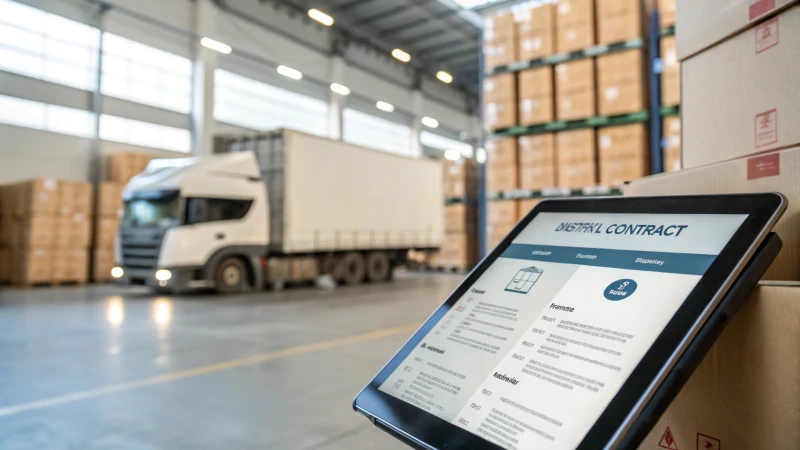
Imagine the thrill of revolutionizing an entire industry with just a few clicks!
Digital contracts revolutionize underwear supply chains by automating transactions, boosting transparency, and reducing errors. They offer a secure, paperless way to define terms and keep a traceable record, enhancing efficiency and collaboration among all parties involved.
I've seen firsthand how digital contracts simplify the chaos of supply chain management. It's like having a trusty assistant who never sleeps, ensuring every detail is in place, from pricing to delivery schedules. Let's explore how these digital marvels are reshaping the way we create and deliver our favorite basics.
Digital contracts eliminate paper records in supply chains.True
Digital contracts provide a paperless method, enhancing efficiency.
Underwear supply chains see no error reduction with digital contracts.False
Digital contracts minimize errors through automation and transparency.
How Do Digital Contracts Benefit Supply Chains?
Imagine transforming your supply chain with just a few clicks! Digital contracts are doing just that—bringing ease and transparency to complex operations.
Digital contracts boost supply chains by streamlining operations, enhancing transparency, and cutting down errors. They automate tasks, secure transactions, and keep all parties informed with clear, accessible records.

Efficiency and Automation
Picture this: It’s a bustling Monday morning, and instead of being buried under a mountain of paper contracts, I find myself sipping coffee, watching as digital contracts seamlessly automate our supply chain operations. It’s like magic—no more tedious manual data entry or frantic searches for misplaced documents. These digital wonders ensure that every contract term is executed without a hitch, freeing up my time to focus on what truly matters—strategizing for the future.
Digital contracts facilitate automation in supply chains1, reducing manual work and minimizing errors. They ensure that contract terms are executed seamlessly without delays, helping companies save time and focus on strategic goals.
| Benefits | Description |
|---|---|
| Time-Saving | Automated processes speed up contract execution. |
| Error Reduction | Minimizes human errors in contract management. |
| Cost-Effective | Reduces administrative costs by eliminating paper handling. |
Enhanced Transparency
In the world of supply chains, transparency isn't just a buzzword; it’s a necessity. I remember when disputes were a regular part of my week—now, with digital contracts, every transaction is recorded and easily accessible. The peace of mind knowing that everyone sees the same information and that nothing can be hidden or lost is invaluable. This clarity reduces disputes and builds trust amongst partners.
Digital contracts provide a transparent framework2 that records all transactions, making them easily accessible and verifiable by all parties.
- Accessible Records: All parties can view contracts at any time.
- Audit Trail: Complete history of contract changes available.
Security and Risk Management
Security was always a nagging worry, but not anymore. Thanks to encryption, digital contracts protect our sensitive information like never before. I sleep better knowing that our data integrity and confidentiality are safeguarded while clearly outlined responsibilities prevent misunderstandings and legal issues from cropping up.
Using digital contracts enhances security through encryption, protecting sensitive information. They help in managing contractual risks3 by clearly outlining responsibilities and penalties.
- Data Security: Encryption ensures data integrity and confidentiality.
- Risk Mitigation: Clear terms prevent misunderstandings and legal issues.
Simplified Communication and Collaboration
Remember the days of endless back-and-forth emails trying to finalize terms? Now, digital contracts allow us to negotiate terms online with ease. It’s like having a virtual conference room where decisions are made faster and everyone is on the same page instantly.
Digital contracts support collaboration by allowing multiple parties to negotiate terms4 online. This improves communication efficiency and accelerates decision-making processes.
- Real-Time Updates: All changes are updated instantly across platforms.
- Collaborative Tools: Integrated tools for negotiation and approval.
Incorporating digital contracts into supply chains isn’t just about keeping up with technology; it’s about transforming the way we work. These tools simplify complex processes, foster trust, enable secure transactions among partners, modernize procurement strategies—and redefine them.
Digital contracts reduce manual errors in supply chains.True
Digital contracts automate processes, minimizing human error in management.
Paper contracts are more secure than digital ones.False
Digital contracts use encryption for data security, surpassing paper methods.
How Do Digital Contracts Ensure Transparency and Accountability?
Ever wonder how digital contracts are changing the game for transparency and accountability? They've turned traditional agreements on their head with some pretty impressive tech.
Digital contracts leverage technology like blockchain to create unchangeable records, ensuring transparency. They automate processes, minimize errors, and provide instant access to terms, building trust among parties.

The Role of Technology in Digital Contracts
Imagine this: you're in the middle of negotiating a crucial business deal, and everything needs to be just right. That's where digital contracts come in. Using advanced technologies like blockchain and smart contracts, they keep every single term locked in place. Once you and the other party agree on something, it’s set in stone—no sneaky changes without everyone's okay. I remember a time when a last-minute change almost derailed a deal because it wasn't properly recorded. With blockchain5, those worries are history because it’s like having a digital vault that no one can tamper with.
A digital contract is coded with specific terms and conditions that are automatically enforced through smart contracts. Picture this: you’re expecting a delivery by next Monday. If it doesn’t show up, the system automatically applies penalties as agreed upon, saving you the hassle of chasing after them. This automation cuts down on human errors and keeps everything running smoothly.
| Technology | Purpose |
|---|---|
| Blockchain | Secure, immutable records |
| Smart Contracts | Automate enforcement |
Real-time Access and Monitoring
One of the game-changing features of digital contracts is real-time access. Back in the day, I’d lose precious hours digging through piles of paperwork just to check contract terms or payment schedules. Now, with digital contracts, it’s all at my fingertips—instant access to what’s going on with any agreement. This transparency means everyone sees the same thing, reducing misunderstandings and disputes.
Plus, these digital wonders often come with handy alerts for deadlines or actions you need to take. It’s like having a personal assistant who ensures everyone stays on track and meets their commitments.
Enhanced Security and Auditability
When it comes to security, digital contracts are top-notch. Thanks to encryption, sensitive information is safe from prying eyes. And because these contracts are stored on decentralized ledgers like blockchain6, there's a complete audit trail. I’ve found this especially useful when verifying that every action complies with what we agreed upon.
This audit trail isn’t just about keeping everyone honest; it provides insights for future deals and performance analysis. By using these technologies, businesses can significantly reduce the risk of fraud and ensure that all parties stick to their commitments.
Digital contracts are more than just a tech upgrade; they’re a leap forward in making sure everyone plays fair and square.
Digital contracts use blockchain for secure records.True
Blockchain technology ensures digital contract data is secure and tamper-proof.
Smart contracts require manual oversight for enforcement.False
Smart contracts automate enforcement, reducing the need for manual oversight.
How Do Digital Contracts Help in Reducing Supply Chain Delays?
Have you ever felt like your supply chain is stuck in a traffic jam, with paperwork and delays piling up?
Digital contracts help cut through supply chain delays by automating tasks, boosting transparency, and minimizing conflicts. They make communication smoother, speeding up approvals and changes, which is crucial for on-time deliveries.

Streamlining Transactions with Automation
Remember those days when I used to drown in a sea of paper contracts? It felt like forever before everything was signed, sealed, and delivered. But with digital contracts, it's like having a personal assistant who never sleeps. They take care of the heavy lifting by automating the contract lifecycle—from drafting to approvals—saving me hours of manual work. Plus, fewer human errors mean fewer hiccups in getting things moving.
Automation reduces the manual effort required for drafting, reviewing, and approving contracts. This not only saves time but also decreases the likelihood of human errors, which can lead to delays in supply chains7. By automating these processes, companies can ensure that all parties are on the same page quickly and efficiently.
Enhancing Transparency and Accountability
In the past, keeping track of who changed what in a contract was like solving a mystery without a clue. Now, digital contracts keep a clear audit trail that anyone can access at any time. It's like having a shared digital diary where every amendment is recorded. This openness builds trust and clears up misunderstandings before they can cause real headaches.
Digital contracts provide a clear audit trail8 that helps in maintaining transparency. Every change or amendment is recorded, ensuring all stakeholders have access to the latest terms and conditions. This transparency is crucial for building trust between partners and minimizing misunderstandings that could otherwise lead to delays.
Reducing Administrative Errors
I still remember the panic of realizing a critical signature was missing just as the deadline loomed. Digital contracts have been a game-changer here. With standardized templates and automated checks, it's like having an extra set of eyes ensuring everything is spot-on. This accuracy keeps the supply chain humming along without unnecessary stops.
Paper-based contracts are prone to errors such as missing signatures or incorrect data entry. Digital contracts help mitigate these risks by providing standardized templates and automated checks. This ensures accuracy and consistency across all contractual documents, further reducing the chances of administrative delays9 in the supply chain process.
Facilitating Faster Negotiations
Negotiations used to drag on as if we were stuck in quicksand. But with digital contracts, it's more like skating on smooth ice. Standardized clauses and real-time collaboration tools make it possible to hash out details quickly, even when parties are continents apart. For industries where time isn't just money but survival, this efficiency is indispensable.
With digital contracts, negotiations can be conducted more swiftly. Standardized clauses and templates allow for quicker drafting and revision while digital platforms enable real-time collaboration between parties regardless of their geographical location. This is particularly important in industries with tight deadlines where every minute counts10.
| Benefit | Impact on Supply Chain |
|---|---|
| Automation | Faster processing times |
| Transparency | Reduced misunderstandings |
| Error Reduction | Fewer administrative delays |
| Faster Negotiations | Quick contract finalization |
Real-World Examples
Take the story of a big retailer that I admire: they slashed their order processing time by 30% using digital contracts by integrating these into their procurement process made their operations smoother and faster than I ever imagined possible.
Many companies are already leveraging digital contracts to improve their supply chain operations; for instance, implementing a digital contract management system11 allowed them to streamline operations significantly.
Another inspiring example comes from a multinational manufacturer: by leveraging digital contracts they enhanced supplier relationships dramatically; disputes that once dragged on now resolve quickly ensuring materials arrive just when needed.
The adoption of digital contracts feels like stepping into the future; as more businesses make this shift potential to trim down delays boost efficiency becomes even more evident—not just about keeping up but setting pace in an ever-evolving world.
Digital contracts reduce supply chain delays by 30%.True
A leading retailer reported a 30% reduction in order processing time using digital contracts.
Paper-based contracts are more accurate than digital ones.False
Digital contracts use standardized templates and automated checks, ensuring more accuracy.
Can Digital Contracts Enhance Collaboration Among Supply Chain Partners?
Ever had that moment where you wished your supply chain partners were as easy to coordinate with as your smartphone's calendar app?
Yes, digital contracts can enhance collaboration among supply chain partners by providing a secure, transparent platform for defining terms, automating contract execution, and ensuring accessible records for all parties involved.

I remember the first time I experienced the chaos of managing supply chain agreements with endless paperwork. It was like trying to solve a jigsaw puzzle where some pieces were always missing or misplaced. Then, I stumbled upon digital contracts, and suddenly, it felt like switching from a clunky old typewriter to a sleek, modern computer.
Understanding Digital Contracts
Digital contracts aren't just high-tech replacements for paper agreements; they're game-changers. They allow us to define everything from pricing to delivery schedules digitally, which means fewer errors and faster updates. Imagine having all your contract details at your fingertips without the clutter of paper.
Benefits of Digital Contracts in Supply Chains
- Increased Transparency: Picture this: every party involved can see a clear, traceable record of agreements, reducing disputes and building trust.
- Streamlined Processes: Remember those long email chains and phone calls for contract negotiations? Digital contracts cut through that, saving time and headaches.
- Enhanced Security: It's like having a digital vault for your sensitive information—securely stored and transmitted.
| Benefit | Description |
|---|---|
| Increased Transparency | Provides clear records accessible to all parties |
| Streamlined Processes | Reduces delays and administrative errors |
| Enhanced Security | Ensures secure storage and transmission of sensitive information |
Real-World Applications
I saw firsthand how industries like automotive and fashion harness these digital wonders. In the world of fashion, particularly in the underwear sector, keeping up with production and delivery schedules was like juggling flaming torches. Digital contracts made it more like a well-rehearsed dance.
- Automotive Industry: Think of coordinating global suppliers for car parts—digital contracts manage these complex webs efficiently12.
- Fashion Industry: Ensures quality and timely delivery by automating contract terms with suppliers around the globe.
Challenges and Considerations
But let's not get ahead of ourselves—there are challenges too. Not every partner is ready or willing to jump on the digital bandwagon. Integration with existing systems can be a real headache, and sometimes staff need extra training to get the hang of new technologies.
Understanding these challenges is crucial if you're considering digital contracts:
- Technology Adoption: Not all partners may be equipped or willing to transition to digital systems.
- Integration Issues: Ensuring compatibility with existing systems can be complex.
- Training Needs: Staff may require training to effectively use new technologies.
Navigating these challenges is crucial if you're considering digital contracts. Weighing the benefits against potential hurdles—and maybe investing in solutions13 that help smooth out the bumps—is key to making it work. It’s about turning those initial apprehensions into a seamless digital transition.
Digital contracts reduce administrative errors.True
Automating processes minimizes human errors in contract management.
All supply chain partners easily adopt digital contracts.False
Not all partners are equipped or willing to transition to digital systems.
Conclusion
Digital contracts transform underwear supply chains by automating transactions, enhancing transparency, reducing errors, and providing secure, accessible records that streamline operations and foster collaboration among partners.
Explore how automation streamlines processes in supply chains, reducing manual errors and saving time. ↩
Discover how digital contracts create a transparent framework for all transactions, reducing disputes. ↩
Learn about the encryption and risk management advantages provided by digital contracts. ↩
Understand how digital tools improve negotiation and collaboration among supply chain partners. ↩
Blockchain technology offers a secure and decentralized way to record transactions, ensuring transparency and trust. ↩
Blockchain's decentralized nature provides unparalleled security, making it ideal for storing sensitive contract data. ↩
Explores how automation in digital contracts reduces time-consuming manual tasks and minimizes errors. ↩
Details how transparency in digital contracts builds trust and minimizes misunderstandings. ↩
Highlights methods digital contracts use to standardize data entry and ensure accuracy. ↩
Explains why fast negotiations are crucial in meeting tight deadlines. ↩
Provides case studies demonstrating the efficiency gains from using digital contracts. ↩
Learn about the role of digital contracts in coordinating global automotive supply chains. ↩
Find solutions to common integration challenges faced when implementing digital contracts. ↩






